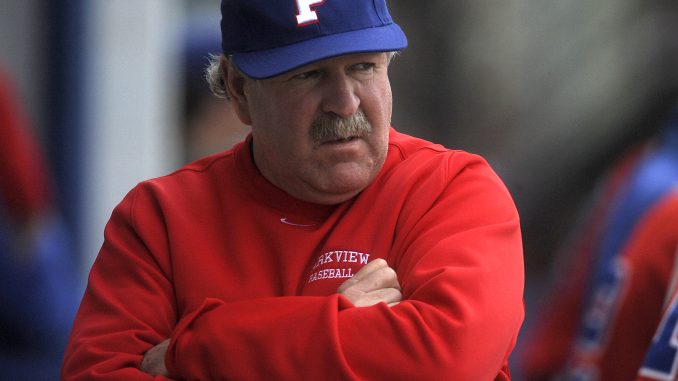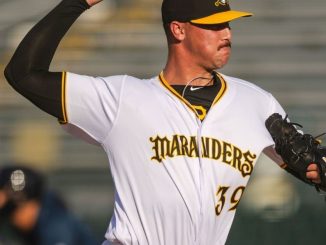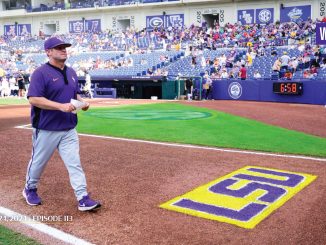
(Editor’s Note: This is the final in a series of former athletes and coaches with ties to LSU that will be inducted into the Louisiana Sports Hall of Fame on July 29 in Natchitoches. Today: M.L. Woodruff).
By ROBIN FAMBROUGH, Written for the LSWA
Many things about M.L. Woodruff’s life paint the picture of an old-school baseball coach.
His meticulous focus on fundamentals and love of working a natural grass field paved the way for 13 state titles at Parkview Baptist.
As he contemplates induction into the Louisiana Sports Hall of Fame, Woodruff is filled with wide-eyed wonder and poignant true confessions.
“This is a story about God putting me in places I never belonged,” Woodruff said. “I never wanted to be a coach. But I needed a job, so I became a coach.
“And now, a guy who went to Robert Livingston Academy is going into the Louisiana Sports Hall of Fame. How crazy is this? It’s wild … beyond my wildest dreams.”
Woodruff made history in 27 seasons as a high school coach. He built the Parkview baseball program from scratch and won 79% of his games. His 603-163-2 record included 11 LHSAA titles and two Louisiana Independent School Association titles.
“In my mind, the first thought is why did this take so long,” former PBS player Kyle Hawthorne said. “No doubt coach Woodruff deserves this. He won and he made us better players and people at the same time.
“The lessons I learned – and the drills we did – I have my own kids do every day. That is what a coach is supposed to do: develop better players and people. I think he did it as well as anyone.”
Woodruff, who lettered in 1976 at LSU and later graduated from the school, and the Eagles often made it look easy. But looks can be deceiving. Woodruff’s life and career prove that point, and have earned his place in the LSHOF Class of 2023. The Induction Celebration is July 27-29 in Natchitoches, with information and tickets available at LaSportsHall.com or by calling 318-238-4255.
Now-defunct Robert Livingston Academy was located on Plank Road near the Baton Rouge airport. The sky was seldom the limit athletically speaking for the LISA member.
“A big part of my story is this – I don’t necessarily love to win … but I do hate to lose,” Woodruff said. “I went through that. My junior year I played basketball and baseball and both teams finished 1-20. I never wanted my players to feel that way.”
Despite those negatives, Woodruff spent a year on the LSU baseball team. Future LSU coach Paul Maineri was part of the program at that time. Future LHSAA commissioner and Hall of Fame member Tommy Henry was a graduate assistant coach who put young players through drills one season.
Still, nothing fueled a desire to coach within Woodruff. A major life change did.
“I was a P.E. teacher at Freshwater Elementary in Denham Springs,” Woodruff explained. “I took the place of a guy who moved to a high school for one year. He came back after that year. I needed a job.
“They had a position open at Doyle. I would teach coed middle school P.E. They told me I would be an assistant football coach and head baseball coach. I had not played football since seventh grade, so I was not sure about that. Since I played baseball at LSU a couple of years I figured ‘Baseball, well, maybe I can do that.’ ”
But the reality was more complicated. At age 23, he was just a few years older than the seniors he coached. As a single parent with two young children, Woodruff had more than high school players counting on him.
The trajectory of Woodruff’s life and career changed after one “coaching moment” that counted as neither a win or loss could.
“I had a catcher named Mike Stovall. He had a strong arm but could not throw anybody out. The reason I did not want to coach is because I thought the older kids would disrespect me … I was fearful,” Woodruff said. “He was about 6-foot-3 and I’m 5-9. I was only about five years older. I knew I had to coach him. I was not sure he was going to listen to me.
“So, I told Mike to see me before practice. I told him what he needed to do. To my amazement, he listened to every word I said. I felt on that day, God saying, ‘You can do this.’ I knew I could teach P.E., but that was the first time I thought I could coach. I have not seen him or talked to him since, but he is part of my story. This is why I say God put me in places I never belonged.”
Another life-changing moment happened months later. Woodruff got a call from legendary Baton Rouge coach/administrator Leon McGraw, who was building an athletic program at Parkview, then a new school.
“I get this call from coach McGraw and he says, ‘Can you come in for an interview now.’ I told him I had been running errands and I had my daughter with me,” Woodruff recalled. “And he said, ‘Well, bring her on … bring her with you.’
“He told me he wanted to start a baseball program and that in another spring sport, he had hired Boots Garland, a track coaching legend. When I got up to leave, coach McGraw said, ‘You know, I like you. I am going to hire you.’ ”
Just like that, Woodruff became head baseball and boys basketball coach at Parkview, a school without a baseball field or a team. The Eagles finished 1-20-1 the next spring. Back-to-back LISA titles followed as the number of students in the school grew. The Eagles were 45-2 in those two seasons before PBS joined the LHSAA.
Moving to Parkview was another divine intervention moment. His children came to Parkview where a welcoming group of players’ parents and coworkers helped care for his son and daughter for several seasons before he remarried.
“Parkview was a very special community and place that gave me what I needed as a teacher, coach and a parent,” Woodruff said. “Coach McGraw was a great mentor for me.
“My children sacrificed a lot in those days because I spent so much time coaching and building a program. I do think about that. Really, I am not sure I would have survived anywhere else.”
Woodruff and the Eagles thrived. Among the 11 LHSAA titles, were five Class 3A titles in a row between 2002-06. His efforts were consistent and painstaking. Fundamental drills and attention to detail were program ideals, not merely ideas.
“I remember when the dugouts did not have roofs on them,” Freddie Joseph said. “I put my initials in the first concrete that was poured. Those were the best times of my baseball career. I learned a lot from coach Woodruff.
“We did drills every day. I did not realize the importance of it at the time, but I was part of the first championship team at Parkview. Then, I understood all that work paid off.”
Joseph’s role in Woodruff’s story is unique. His father was Woodruff’s assistant coach at Doyle and he played on that team as an eighth-grader. Joseph transferred to Parkview for his final two high school seasons.
Stories about the drills and Woodruff’s love of working the Eagles’ natural grass field are as legendary as the things Parkview did on that field. There was a fielding drill in which a wooden glove with a felt strap was used. No stone was left unturned in the Eagles’ scouting reports. The same was true for the PBS field.
“We would spend Friday night at school in the gym, get up in the morning to practice and then we would work the field,” Hawthrone recalled. “We stood side-by-side and checked the dirt. Any pebble or rock was removed.”
It is no surprise that Woodruff is not fond of artificial turf fields. A neighbor made a child-sized mower for Woodruff when he was six, so a love for working the field came naturally.
“Turf is great for a lot of things I’m sure,” Woodruff offered. “Nothing builds toughness and teamwork like having your players put a tarp on the field and then take it off.”
There was more to Woodruff’s methods than being a taskmaster.
“When he coached, he always reached out to mentor young coaches. He still does that now through his (Istrouma) sports ministry and Bible study for coaches,” said Darron Mitchell, who succeeded Woodruff at Parkview after spending 11 years as an assistant.
“I tell people all the time now that I was spoiled by being his assistant. I used to say ‘M.L., you delegate everything.’ And he would say, ‘No, Mitch, I empower people.’ What he was doing was preparing us for the future. When I got to be a head coach and later an athletic director, I was prepared for it.”
There were lighter moments too.
When Woodruff gave players a stern lecture, Mitchell says he would turn around and smile, asking, “How did I do?” There was a time when Woodruff took off his uniform pants to give them to an embarrassed player who had left his pants at home. Or those times when he forgot his belt, one sock or his baseball cap.
The story no one knew involves a postgame speech Woodruff never had to give and the photo taken afterwards. PBS fell behind Catholic-New Iberia 4-0 in the 2006 Class 3A title game. Their catcher fainted due to the heat. The Eagles made some miscues.
“We lost to Teurlings (in 1990) and I made a mistake. I said things after the game I should not have said,” Woodruff explains. “So, I wrote this get-beat speech and I kept it with me. I wanted to say the right things if it happened again. I had it (speech) in my pocket. It did not look like it was going to be our day.
“Those guys believed in the process, (and) each other and won. They were amazing. There’s this picture of me smiling ear to ear – but not because we won. Yes, I was just glad we did not get beat. That represents who I am.”




Be the first to comment